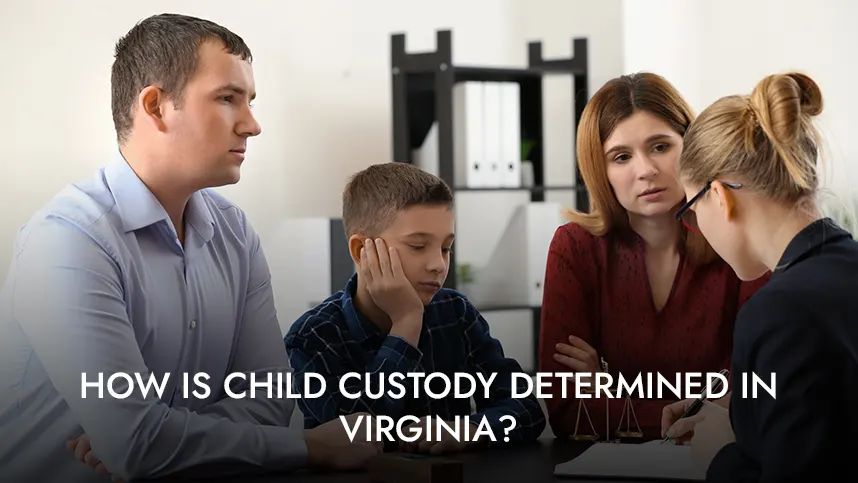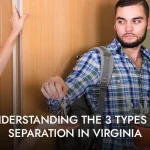As a parent facing a child custody battle in Virginia, you’re probably feeling overwhelmed and uncertain about what lies ahead. We at Holcomb Law know how stressful it can be. But don’t worry, we’re here to guide you through the process and help you understand how child custody is determined in the Commonwealth of Virginia.
Understanding the Basics of Child Custody in Virginia
Child custody cases are some of the most emotionally charged and complex legal matters. In Virginia, the courts take these cases very seriously, always prioritizing the best interests of the child above all else.
Before we dive into the determination process, let’s break down the two types of custody in Virginia:
- Legal custody: This refers to decision-making authority regarding the child’s upbringing, education, healthcare, religious instruction, and the like.
- Physical custody: This pertains to where the child primarily resides and the day-to-day care of the child.
Each of these can be awarded as sole custody to one parent or joint custody shared between both parents. In our experience, courts often prefer joint custody arrangements when possible, as they believe it’s generally in the child’s best interest to have both parents involved in their life. However, judges make determinations on a case-by-case basis, and may decide to award sole custody to one parent if it is the most suitable arrangement.
Joint Custody
Joint custody means both parents share rights and responsibilities in raising their child. It can take the form of joint legal custody, joint physical custody, or a combination deemed best for the child.
Joint legal custody focuses on shared decision-making, even if the child primarily lives with one parent. Virginia law encourages ongoing contact with both parents when appropriate. Joint physical custody involves the child splitting time between both parents, but is less common than joint legal custody.
Sole Custody
Sole custody grants one parent primary authority over the child’s development and major decisions. It’s rarely awarded, typically only in extreme cases of family discord, abuse, or unreasonable denial of access to the child.
Obtaining Custody: Litigation Versus Negotiation
In many custody and visitation cases, parents can reach an agreement through negotiation rather than going to court. Married couples who are separated may include custody arrangements in a Separation Agreement, which can later be incorporated into a divorce decree. Unmarried parents or those not living together can submit a “Consent Custody and Visitation Order” to the Juvenile and Domestic Relations District Court.
When parents can’t agree, they can ask the court to decide custody as part of a divorce proceeding, or file petitions with the domestic relations court. However, these legal routes can be time-consuming, potentially taking months or even over a year to resolve. Litigated custody cases are also financially and emotionally taxing.
While some parents have no choice but to go to court, many find that compromise and entering a consent order is a preferable alternative to a full custody hearing. This approach can save time, money, and emotional stress for all parties involved.
The “Best Interests of the Child” Standard
In Virginia, as in many other states, the primary standard used to determine child custody is the “best interests of the child.” But what does this really mean?
The Virginia Code section 20-124.3 outlines several factors that courts must consider when determining the best interests of the child. These include:
- The age and physical and mental condition of the child
- Each parent’s age, physical condition, and mental state
- The relationship existing between each parent and the child
- The needs of the child
- The past and future role of each parent in child care and upbringing
- The inclination of each parent to support the child’s relationship and contact with the other parent
- The degree to which each parent is willing and able to continue having a close relationship with the child
- The preference of the child, if the court deems the child to be of reasonable intelligence, understanding, age, and experience to express such a preference
- Any history of family abuse or sexual abuse
- Such other factors as the court deems necessary and proper to the determination.
The Custody Determination Process
Now that we understand the factors, let’s walk through the typical process of how custody is determined in Virginia.
1. Initial Filing
The process begins when one parent files a petition for custody with the Juvenile and Domestic Relations District Court. We always advise my clients to be prepared for this step, as it sets the tone for the entire process.
2. Mediation
Before the case goes to trial, many Virginia courts require parents to attempt mediation. We’ve seen countless cases resolved at this stage, with parents coming to mutually agreeable custody arrangements. It’s often less stressful and more cost-effective than going to trial.
3. Guardian ad Litem
In some cases, especially those involving allegations of abuse or neglect, the court may appoint a guardian ad litem. This is an attorney who represents the child’s best interests. We’ve worked with many guardians ad litem, and their input can be crucial in helping the court make its decision.
4. Home Studies
The court might order home studies, where a social worker visits each parent’s home to assess the living conditions and family dynamics. We always advise my clients to be honest and open during these visits. Home studies are not about having the fanciest house, but about demonstrating a safe and nurturing environment for the child.
5. Court Hearings
In the event that mediation is not successful, a hearing will be held. Both parents will have the opportunity to present evidence and testimony supporting their position. The judge will then make a decision based on all the evidence presented and the factors outlined in the best interests standard.
Special Considerations in Virginia Custody Cases
Military Families
Given Virginia’s large military population, it’s worth noting that the state has specific provisions for military families in custody cases. The Virginia Military Parents Equal Protection Act ensures that a military parent’s service cannot be used against them in custody determinations.
Relocation Cases
If a custodial parent wants to move with the child, they must prove to the court that the move is in the child’s best interest. These cases can be particularly complex and often require a modification of the existing custody order.
The Importance of Documentation
One piece of advice we always give our clients is to document everything. Keep a record of your involvement in your child’s life, including school events, doctor’s appointments, and extracurricular activities. This documentation can be invaluable evidence if your case goes to court.
Post-Determination: Custody Modifications
Custody orders aren’t set in stone. As children grow and circumstances change, it may be necessary to modify the custody arrangement. In Virginia, you can petition for a modification if there’s been a material change in circumstances that affects the child’s best interests.
FAQ: How is Child Custody Determined in Virginia?
Can children choose which parent they want to live with in Virginia?
In Virginia, the child’s preference is one of the factors considered in custody determinations, but it’s not the sole deciding factor. The court will consider the child’s wishes if they are of “reasonable intelligence, understanding, age, and experience to express such a preference.” However, there’s no specific age at which a child is considered old enough to have their wishes considered.
For instance, a 16-year-old’s well-reasoned preference might carry more weight than that of a 7-year-old. However, if the court suspects that a child’s preference is based on improper influence from one parent or on immature reasoning (like wanting to live with the more lenient parent), it may disregard or give less weight to that preference.
Ultimately, the child’s choice is just one of many factors the court considers in determining what arrangement is in the child’s best interests. The court will always prioritize the child’s overall well-being over their stated preference.
How does Virginia handle joint custody arrangements?
Virginia courts favor joint custody arrangements whenever appropriate, believing that it’s in the child’s best interest to have significant contact with both parents. However, “joint custody” can mean different things in different situations.
Joint legal custody means both parents share the right and responsibility to make important decisions about the child’s upbringing, such as education, healthcare, and religious instruction. Parents with joint legal custody must communicate and cooperate in making these decisions, regardless of where the child primarily resides.
Joint physical custody, where the child spends substantial time living with each parent, is less common but still possible. This doesn’t necessarily mean a 50/50 split of time; it could be any arrangement where both parents have significant periods of physical custody.
The specific joint custody arrangement depends on various factors. Some of these factors are the parents’ work schedules, the child’s school and activity schedule, the distance between the parents’ homes, and the parents’ ability to cooperate and communicate effectively.
Note that even in joint custody arrangements, one parent may be designated as the primary physical custodian, with whom the child resides for the majority of the time. The other parent would then have visitation rights or parenting time.
Virginia courts will approve joint custody arrangements if they believe it’s in the child’s best interests and if the parents demonstrate an ability to cooperate and make decisions together regarding the child’s welfare.
How does Virginia handle custody in cases involving domestic violence?
Virginia takes domestic violence very seriously in custody cases. The presence of family abuse is one of the factors explicitly listed in Virginia Code section 20-124.3 that courts must consider when determining custody and visitation arrangements.
The court’s primary concern is always the safety and well-being of the child. Here’s how domestic violence might affect a custody case:
- Presumption against the abuser: While Virginia doesn’t have a statutory presumption against awarding custody to an abusive parent, judges have a less-favorable view of parents who are strongly evidenced to have inflicted domestic violence.
- Supervised visitation: If the court determines that unsupervised contact with an abusive parent could put the child at risk, it may order supervised visitation. This means the abusive parent can only spend time with the child under the watch of a court-approved supervisor.
- Protective orders: If there’s an active protective order against one parent, this will be taken into account in custody decisions. The terms of the protective order may limit or structure how custody and visitation can occur.
- Impact on joint custody: Evidence of domestic violence may make the court less likely to award joint custody with the alleged abuser, as it may pose a risk to the child or the other parent. It could also indicate a lack of ability to cooperate.
- Mandatory reporting: In Virginia, if a judge has reason to suspect that a child is being abused or neglected, they are required by law to report this to Child Protective Services.
- Batterer intervention programs: In some cases, the court may require an abusive parent to complete a batterer intervention program or anger management course as a condition of visitation or custody.
Also note that false allegations of abuse are taken very seriously by the courts. If a parent is found to have made false accusations of abuse to gain advantage, it could severely damage their custody case.
If you’re involved in a custody case where domestic violence is a factor, it’s essential to work with an experienced family law attorney. We at Holcomb Law can help ensure that all relevant evidence is presented to the court and that the safety of you and your child is prioritized.
How does Virginia handle custody in cases involving substance abuse?
Since the court’s priority is the safety and well-being of the child, substance abuse by a parent can raise serious concerns about their ability to provide proper care and a stable environment. Here’s how Virginia courts typically approach custody cases involving substance abuse:
- “Best interests” standard: Like all custody decisions, cases involving substance abuse are decided based on the best interests of the child. Substance abuse is considered under the factor that looks at the physical and mental condition of each parent.
- Evidence of substance abuse: The court will consider any evidence of substance abuse, which may include:
- Drug test results
- Criminal records related to substance use
- Testimony from witnesses
- Medical records
- Evidence of how the substance abuse has affected the parent’s ability to care for the child.
- Impact on custody: If a parent is found to have a substance abuse problem, it can significantly impact custody decisions:
- The court may limit or deny custody to the parent with substance abuse issues.
- Visitation may be supervised or contingent upon the parent maintaining sobriety.
- The court may order random drug testing as part of the custody agreement.
- Treatment and rehabilitation: If a parent is actively seeking treatment for substance abuse, the court may take this into consideration. Successful completion of a rehabilitation program and ongoing sobriety can positively influence custody decisions.
- Modification of custody: If substance abuse issues arise after an initial custody order is in place, the other parent can petition for a modification of custody based on this change in circumstances.
- Temporary custody arrangements: In cases where substance abuse is an immediate concern, the court may make temporary custody arrangements to ensure the child’s safety while the parent seeks treatment.
- Guardian ad Litem: In cases involving substance abuse, the court may appoint a guardian ad litem to represent the child’s best interests and investigate the impact of the substance abuse on the child.
- Safety plans: The court may require the development of a safety plan. This could include measures like having another adult present during visitation or requiring the parent to abstain from alcohol or drugs for a certain period before and during visitation.
Courts will favor arrangements that allow children to maintain relationships with both parents when it’s safe to do so. If a parent with past substance abuse issues can demonstrate sustained recovery and the ability to provide a safe environment for the child, they may still be able to obtain custody or visitation rights.
How does Virginia handle custody when one parent wants to relocate?
When a custodial parent wishes to move with the child, especially to a different state or country, it can significantly impact the non-custodial parent’s ability to maintain a relationship with the child.
In Virginia, the parent wanting to relocate must prove that the relocation is in the child’s best interest. This is a high standard to meet, especially if the move would substantially interfere with the other parent’s visitation rights. Here’s how Virginia courts typically handle relocation cases:
- Notice requirement: The parent wishing to relocate must provide written notice to the other parent and the court, typically at least 30 days before the intended move.
- Burden of proof: The relocating parent bears the burden of proving that the move is in the child’s best interest. They must show that the benefits of the move outweigh the disruption to the child’s relationship with the other parent.
- Factors considered: When deciding whether to allow the relocation, the court will consider various factors, including:
- The reason for the move (such as job opportunity or remarriage)
- The benefit of the move to the relocating parent and child
- The impact on the child’s relationship with the non-relocating parent
- The feasibility of alternative visitation arrangements
- The child’s ties to the current community (school, friends, and extended family)
- The child’s age and preferences (if old enough).
- Modification of custody order: If the court allows the relocation, it will likely modify the existing custody and visitation order to account for the new circumstances. This might include extended summer or holiday visitation for the non-relocating parent.
- Virtual visitation: If physical distance makes frequent in-person visits difficult, the court may order “virtual visitation” through video calls or other technology to help maintain the child’s relationship with the non-relocating parent.
- Travel costs: The court may address how travel costs for visitation will be shared between parents in light of the increased distance.
Courts often view relocation cases skeptically, especially if the move would significantly reduce the non-custodial parent’s time with the child. The relocating parent must present a compelling case that the move truly is in the child’s best interest, not just beneficial for the parent.
If you’re considering relocating with your child or if your co-parent wishes to move, it’s crucial to consult with an experienced family law attorney as early as possible. These cases can be complex and emotionally charged, and having skilled legal representation can make a significant difference in the outcome.
When Seeking Child Custody in Virginia, Get a Skilled Family Law Attorney by Your Side
There are many variables in child custody, and you’ll need to present the most compelling case to the court, showing you are fit to have custody of your child. To do this, it’s important to have an experienced child custody attorney.
At Holcomb Law, our attorneys have decades of experience in Virginia family law and child custody law. We’re ready to guide you through these challenging situations and represent you in complex cases. Don’t hesitate to reach out to us at (757) 656-1000 for personalized legal help on your custody case.










